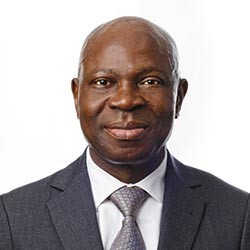Gilbert Houngbo, President of IFAD, at the 2021 Global ODA Forum for Sustainable Agricultural Development
IFAD Asset Request Portlet
ناشر الأصول
Gilbert Houngbo, President of IFAD, at the 2021 Global ODA Forum for Sustainable Agricultural Development
23 نوفمبر 2021First, let me thank the organizers of this Forum, particularly the Ministry of Agriculture, Food, and Rural Affairs of the Republic of Korea and the Korean FAO Association, for giving me this opportunity to speak with you today.
Six years ago, we set our sights on 2030 as the deadline for eliminating hunger and poverty—the first two of the Sustainable Development Goals.
While progress has been made, many of the Sustainable Development Goals remain far out of reach. The challenges we face are numerous and formidable, with the global pandemic and the effects of climate change at the top of the list.
Urgent action is needed to protect development gains already made, as well as to increase investment in development by nations and by multilateral institutions to get us back on track to eliminate poverty and hunger for good.
Food systems are at the nexus of these issues. By transforming food systems, and investing in small-scale producers and other rural people, we can take a major step toward overcoming these challenges.
I say this for two reasons. First, hunger and poverty are concentrated in rural areas, where a majority of people depend on food systems for their livelihoods. But also, these populations are important development actors, and there is enormous potential for them to play a much bigger and positive role.
But the support has to be there. Farmers will need our help if they are to grow more food, more sustainably.
Transforming food systems not only can increase their incomes and food security. It also presents opportunities to address farming’s environmental footprint, as well as preserve biodiversity.
Food systems today are inequitable and do not work for the people who work in them. This affects everyone, but rural people are hit the hardest – and particularly women, youth and Indigenous Peoples.
IFAD is proud to be working with partners across the development community to reach the poorest and most vulnerable people.
This includes the Decent Wages and Living Income and Wages coalition, and initiatives to increase access to finance for rural producers and shift investments to more environmentally sustainable and fairer systems.
The Republic of Korea continues to be a key strategic partner that has been instrumental in supporting smallholder farmers in the Pacific region through information and communication technologies.
IFAD and Korea have been working together on innovative ways in which IT can be used to improve rural livelihoods, strengthen links to markets, and make rural areas places of opportunity for the next generation.
Sustainable and inclusive development requires long-term investment. It is not about one country or one project. It is about all of us, and an ongoing commitment to a sustainable future in which no one is left behind.
We look forward to working with all countries and partners to transform our food systems – the foundation of a sustainable future for all.
Thank you.
